Planning worship?
Check out our sister site, ZeteoSearch.org,
for 20+ additional resources related to your search.
- |
User Links
Person Results
Rudyard Kipling

1865 - 1936 Author of "Father in heaven, who lovest all" in Hymnal for American Youth Born: December 30, 1865, Bombay (now Mumbai), India.
Died: January 18, 1936, London, England.
Buried: Westminster Abbey, London, England.
Kipling, Rudyard, the well-known poet and story-teller, was born at Bombay, India, Dec. 30, 1865, and now (1906) lives at Burwash in Sussex. His noble poem, "The Recessional," was written in 1897 at the time of the Diamond Jubilee of Queen Victoria, contributed to the Times for July 17, 1897, and first published by the author in his The Five Nations, 1903, p. 214, beginning "God of our fathers, known of old" (National). It has passed into Sursum Corda, Phil., 1898, The English Hymnal, 1906. [Rev. James Mearns, M.A.]
--John Julian, Dictionary of Hymnology, New Supplement (1907)
Rudyard Kipling
W. Shrubsole
1759 - 1829 Person Name: William Shrubsole Author of "When, streaming from the eastern skies" in Church Hymns and Tunes William Shrubsole was born in Sheerness, Kent, in 1759. His first occupation was as a shipwright in Sheerness Dockyard, but he was promoted, and afterwards removed to London, where he at length held the position of Secretary to the Committee of the Treasury in the Bank of England. He died at Highbury, in 1829. Mr. Shrubsole was the author of several hymns, and some articles in the religious magazines of his day.
--Annotations of the Hymnal, Charles Hutchins, M.A. 1872.
=============================
Shrubsole, William, eldest son of William Shrubsole, a master mastmaker in the dockyard at Sheerness, Kent, and a Lay Preacher, was born at Sheerness, Nov. 21, 1759. In his earlier years he was engaged as a shipwright in the dockyard, and then as a clerk. In 1765 he removed to London, and entered the Bank of England as a clerk. He subsequently became the Secretary to the Committee of the Treasury. He died at Highbury, Aug. 23, 1829. Mr. Shrubsole was for some time a communicant at St. Anne's, Blackfriars, during the incumbency of the Rev. W.Goode; but during the last twenty years of his life he was a member with the Congregationalists, and attended the Hoxton Academy Chapel. He interested himself in religious societies, and especially the London Missionary Society (of which he became a director and one of the secretaries), the Bible Society, and the Religious Tract Society. He contributed hymns to the Evangelical Magazine, the Christian Magazine, the Theological Miscellany, the Christian Observer and the Youths' Magazine, at various dates, from 1775 to 1813. To these works we have traced nearly twenty of his hymns. A Memoir of Shrubsole was contributed by his daughter to Dr. Morison's Fathers and Founders of the London Missionary Society, 2 vols., London, Fisher, Sons & Co., 1844. Seven of his hymns are also given, together with a portrait, in the same work. His hymns in common use include:—
1. Arm of the Lord, awake, awake. Put on Thy strength, the nations shake. Missions. This appeared in Missionary Hymns, 1795; and in Morison's Fathers and Founders, &c, 1844, vol. i. p. 451, in 6 stanzas of 4 lines. Dr. Rogers in his Lyra Britannica, 1867, attributes this hymn to Shrubsole's father, and dates it 1780. Against this statement we can only put the fact that it is claimed in Morison for the son. Original text, Lyra Britanica, 1867, p. 502.
2. Bright as the sun's meridian blaze . Missions. Written Aug. 10, 1795, for the first meeting of the London Missionary Society. It was printed in the Evangelical Magazine, Sept., 1795, headed “On the intended Mission," and signed "Junior." It is also in Morison, 1844, i. p. 449, together with the note that the hymn "was duly acknowledged by Mr. Shrubsole in his lifetime, and the original manuscript, with numerous corrections, is in possession of his family, in his own autograph," and that it bears date "August 10, 1795." Original text Lyra Britanica, 1867, p. 504.
3. In all the paths my feet pursue. Looking unto Jesus. Appeared in the Evangelical Magazine, 1794; in Morison, i., 1844, p. 454; and Lyra Britanica, 1867, p. 503.
4. Shall science distant lands explore? Missions. Published in the Evangelical Magazine, 1795; and again in Morison, 1844, i. p. 452.
5. When streaming from the Eastern skies . Daily Duties; or, Morning. Published in the Christian Observer, Aug., 1813, in 8 stanzas of 8 lines, headed "Daily Duties, Dependence and Enjoyment," and signed Probus. Also in Morison, 1844, i. p. 453; and Lyra Brittanica, 1867, p. 505. The well-known cento, "As every day Thy mercy spares," is from this hymn, and begins with st. iii.
6. Ye saints, your grateful praises bring
W. Shrubsole
Anne Bronte
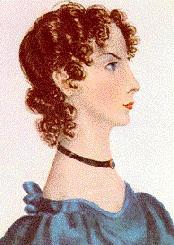
1819 - 1849 Person Name: Anne Brontë Author of "Music on Christmas Morning" in The Cyber Hymnal Brönté, Anne, sister of Charlotte, and daughter of the Rev. Patrick Bronte, B.A., Vicar of Haworth, Yorkshire, born at Thornton, near Bradford, 1819; died May 28, 1849. Anne Brönté was joint author with her sisters of a small volume of Poems, 1846, and personally of Agnes Grey, 1847; and The Tenant of Wildfell Hall, 1847, her nom de plume being Acton Bell. In 1851 a new edition of Wuthering Heights, by Ellis [Emily] Bell; and Agnes Grey, by Acton [Anne] Bell, was edited, with biographical notes, and selections from their papers by their sister, Charlotte Brönté. These selections consisted of poems and hymns by the two sisters. From those of Anne the following have come into common use:—
1. I hoped that with the brave and strong. Time of Sorrow. A hymn of much plaintive beauty, wrung from the writer by disappointment and affliction. It is in several collections, as Horder's Congregational Hymns, 1884, &c.
2. My God, 0 let me call Thee mine. Lent, Also very plaintive, but not so extensively in use. It is No. 291 in the Baptist Hymnal, 1879.
3. Oppressed with sin and woe. Confidence. The most popular, although not the best of her hymns. It is in many collections, both in Great Britain and America.
4. Spirit of truth, be Thou my Guide. Spirit of Truth. In a few hymnals, including Dr. Martineau's Hymns of Praise & Prayer , 1873.
-- John Julian, Dictionary of Hymnology (1907)
Anne Bronte
Derek Kidner
b. 1913 Person Name: Derek Kidner, b.1913 Adapter of "PATER OMNIUM" in The Book of Praise
Derek Kidner
Jeffery W. Rowthorn

b. 1934 Person Name: Jeffery Rowthorn Author of "Retell What Christ's Great Love Has Done" in Voices United Jeffery W. Rowthorn (b. Newport, Gwent, Wales, 1934) wrote this text in 1978 while he was Chapel Minister at Yale Divinity School, New Haven, Connecticut. The text was first published in Laudamus (1980), a hymnal supplement edited by Rowthorn and used at the Yale Divinity School.
Rowthorn graduated from Cambridge and Oxford Universities, Union Theological Seminary in New York, and Cuddeson Theological College in Oxford. Ordained in 1963 in the Church of England, he served several congregations in England before immigrating to the United States, where he was chaplain at Union Theological Seminary and a faculty member in liturgics at the Yale Institute of Sacred Music, which he helped to establish. He was then elected Suffragan Bishop of the Episcopal Diocese of Connecticut. The writer of several hymns, Rowthorn was also coeditor with Russell Schulz-Widmar of A New Hymnal for Colleges and Schools (1991). Rowthorn has since moved to Paris, where he is Bishop in Charge of the American Churches in Europe.
--hymnopedia.com/
Jeffery W. Rowthorn
Joachim Lange
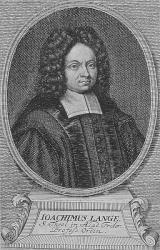
1670 - 1744 Person Name: Joachim Lange, 1670-1744 Author of "O God, what offering shall I give" in Singing the Faith Lange, Joachim, D.D., son of Mauritius Lange, senior councillor at Gardelegen in the Altmark, was born at Gardelegen, Oct. 26, 1670. He entered the University of Leipzig in the autumn of 1689, where he shared rooms with A. H. Francke; and in 1690 followed Francke to Erfurt, and in 1692 to Halle. By the recommendation of J. O. Schade he was appointed, in 1693, tutor to the only son of F. R. L. von Canitz, at Berlin. Subsequently he became, in 1696, rector of the school at Coslin in Pomerania; in 1698 rector of the Friedrichswerder Gymnasium at Berlin, and in 1699 pastor of the Friedrichstadt church; and in 1709, professor of theology at Halle (D.D. 1717), where he d. May 7,1744 (Koch, iv. 343; Allg. Deutsche Biographie, xvii. 634, &c). In his day Lange was best known as a commentator on the whole Bible (Biblisches Licht und Recht, &c, 7 folio vols., Halle, 1730-1738); as a defender of Pietism against the “Orthodox” Lutheran controversialists of the early 18th century; and as the author of over 100 theological works. Only two hymns are known by him, one of which is:—
O Jesu, süsses Licht. Morning. First published in the Geistreiches Gesang-Buch, Halle, 1697, p. 4, in 8 stanzas of 8 lines. Repeated in Freylinghausen's Gesang-Buch, 1704, No. 608, and recently, as No. 469, in the Unverfälschter Leidersegen, 1851. Translated as:—
Jesu, Thy light again I view. A free translation, in 7 stanzas of 6 lines, by J. Wesley, in Hymns & Sacred Poems, 1739 (Poetical Works, 1868-72, vol. i. p. 159) ; repeated as No. 661 in pt. i. of the Moravian Hymn Book, 1754 (1886, No. 344, abridged). The form most used is that in the Wesleyan Hymn Book, 1780, No. 419, where st. i. is omitted; and it begins with st. ii., altered to "O God, what offering shall I give." This form is in Mercer, 1857 and 1864, Kennedy, 1863, and others; and in America, in the Methodist Episcopal Hymns, 1849, Evang. Association Hymn Book, 1882, &c. In the American Sabbath Hymn Book, 1858, a cento from Wesley's stanzas iii., vi., vii., is given as No. 917, beginning, "Now, O my God, Thou hast my soul."
Other translations are: (1) "O let me always think Thou'rt near," by J. Swertner, of st. vii., as No. 430 in the Moravian Hymn Book, 1789. In the 1801 and later editions. (1886, No. 567) it is altered, and begins, "O let us always think Thee near." (2) "O Jesu, welcome Light," by H. J. Buckoll, 1842, p. 47. (3) "O Jesu, Light most sweet." In the Family Treasury, 1879, P- 230. [Rev. James Mearns, M.A.]
--John Julian, Dictionary of Hymnology, Appendix, Part II (1907)
Joachim Lange
Andrew Pratt
b. 1948 Person Name: Andrew Pratt, b. 1948 Author of "There are no strangers to God's love" in Singing the Faith
Andrew Pratt
Joseph Hinchsliffe
1760 - 1807 Author of "This Is the Field" in The Cyber Hymnal Hinchsliffe, Joseph, a Sheffield manufacturer, and a member of the Wesleyan body, was born at Sheffield in 1760, and died at Dumfries in 1807. Concerning his hymn in the Primitive Methodist Hymnal, 1887, "This is the field, the world below" (Death and the Resurrection), Dorricott and Collins say in their Lyric Studies, 1889, p. 289, "It has been traced to a Tract, entitled Favourite Hymns, Odes, and Anthems, as Sung at the Methodist Chapels in Sheffield, Rotherham, Doncaster and Nottingham Circuits, Fifth edition, 1797, and immediately under the title of this hymn are the words 'By J. Hinchsliffe.'"
--John Julian, Dictionary of Hymnology, Appendix, Part II (1907)
Joseph Hinchsliffe
Watchman Nee
1903 - 1972 Author of "當我蒙思能夠施恩 (When I Grace To Mercy)" in Sheng tu shi ge = Hymnary (聖徒詩歌)
Watchman Nee
Elizabeth Barrett Browning
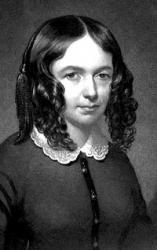
1809 - 1861 Person Name: Elizabeth B. Browning Author of "Of All the Thoughts of God" in The Cyber Hymnal Browning, Elizabeth, née Barrett, daughter of Mr. Barrett, an English country gentleman, and wife of Robert Browning, the poet, was born in London 1809, and died at Florence in 1861. As a poetess she stands at the head of English female writers, and her secular works are well known. Sacred pieces from her works are in common use in America. They include:
1. God, named Love, whose fount Thou art. Love.
2. How high Thou art! Our songs can own. Divine Perfection.
3. Of all the thought of God, that are. Death.
4. What would we give to our beloved? Pt. ii. of No. 3.
5. When Jesus' friend had ceased to be. Friendship. Based on the death of Lazarus.
These hymns are in Beecher's Plymouth Collection 1855; Hedge and Huntington's Hymns for the Church of Christ, Boston, U.S., 1853, &c.
-- John Julian, Dictionary of Hymnology (1907)
=====================
Browning, Elizabeth, née Barrett, p. 187, i. We find that the usually accepted birth-place (London) of Mrs. Browning must be corrected. She was born at Coxhoe Hall, Durham, March 6, 1806, and baptised as Eliza¬beth Barrett Moulton Barrett at Kelloe Church, Durham, Feb. 10, 1808. [Rev. James Mearns. M.A.]
--John Julian, Dictionary of Hymnology, New Supplement (1907)
Elizabeth Barrett Browning
John Quarles
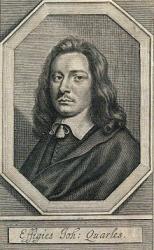
1624 - 1665 Person Name: J. Quarles Author of "Fountain of light and living breath" in Worship Song Quarles, John, son of Francis Quarles, was born in Essex in 1624, and was educated at Exeter College, Oxford. He bore arms within the garrison at Oxford on behalf of Charles I. and subsequently (it is said) he was raised to the rank of captain in the King's service. On the downfall of the King, Quarles retired to London, and devoted himself to literature for a livelihood. He died there during the great Plague, 1665. He published several works including (1) Jeremiah's Lamentations Paraphrased, with Divine Meditations, 1648; and (2) Divine Meditations upon Several Subjects whereunto is annexed God's Love to Man’s Unworthiness, with several Divine Ejaculations. London, 1655 (Wood's Athenae Oxon.). From the Ejaculation, Mr. Darling adapted two hymns for his Hymns for the Church of England. In the 1889 ed. these are:— “O King of kings, before Whose Throne" (Holy Trinity); and "O Thou Who sitt'st in heaven and seest" (Visitation of Sick).
--John Julian, Dictionary of Hymnology (1907)
John Quarles
Eugene Field
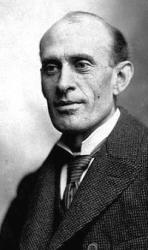
1850 - 1895 Person Name: Eugene Field, 1850-1895 Author of "The Three Kings of Cologne" in The Cyber Hymnal Field, Eugene, an American journalist who has written somewhat extensively for children, was born at St. Louis, Missouri, Sep. 2, 1850, educated at the University of Missouri, and died Nov. 4, 1895. His published works include Little Book of Western Verse, 1889; Second Book of Verse, 1891; and Love Songs of Childhood, 1894. A limited number of his hymns are in common use in America, and specimens of his verse are given in Horder's Treasury of American Sacred Song, 1900, pp. 283-287. See also "There burns a star o'er Bethlehem town."
--John Julian, Dictionary of Hymnology, New Supplement (1907)
Eugene Field


 My Starred Hymns
My Starred Hymns


